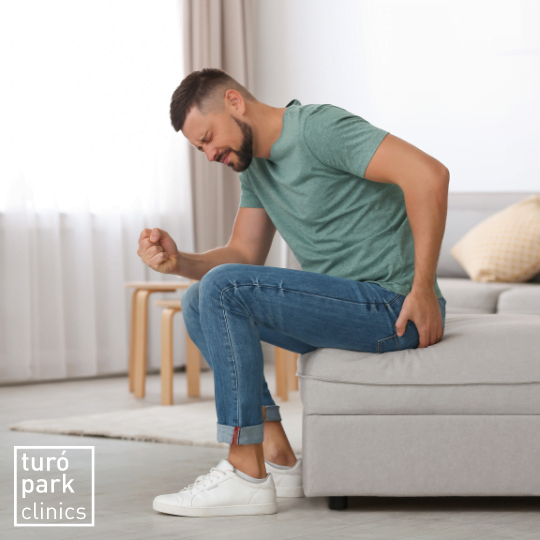Are you suffering from haemorrhoids and looking for a specialist in Barcelona?
Haemorrhoids are painful, yet very common. It is estimated that approximately 86% of the population will complain of having suffered from it in their lifetime... Symptoms usually stop within a few days but tend to recur and can lead to daily discomfort.
If you suffer from haemorrhoids, don't wait to make an appointment with a specialist. Appropriate treatment will enable you to relieve the symptoms and avoid recurrences.
Hemorrhoids: What are they?
Haemorrhoids are enlarged and tortuous blood vessels in the wall of the lower rectum and anus. They are normal formations in the anus that contribute to continence.
There are two types of haemorrhoids:
- Internal haemorrhoids: these are haemorrhoids that form upstream of the junction between the anus and rectum (anorectal junction).
- External haemorrhoids: these are haemorrhoids that form below the anorectal junction.
Haemorrhoids become pathological when they cause disabling symptoms. This is known as haemorrhoidal disease or haemorrhoidal crisis.
Fast track your treatment
To book an appointment or speak with one of our friendly team, please get in touch using the options below.

What are the symptoms of a haemorrhoidal attack?
The symptoms of haemorrhoidal disease vary from person to person and from location to location.
The most common symptoms of haemorrhoids are
- Pain
- Bleeding
- Internal haemorrhoids protrude from the anus (prolapse).
Causes of haemorrhoids
Haemorrhoids are caused by increased pressure in the vessels in the anorectal area.
The main cause of haemorrhoidal attacks is therefore constipation, as this leads to repeated pushing to evacuate the stool. Pregnancy and frequent lifting can also cause attacks.
Consumption of certain foods can also be a risk factor for haemorrhoids, including meats, spicy foods, coffee, tea and alcohol.
How to treat haemorrhoids?
The treatment of a haemorrhoidal attack generally combines a mild laxative, analgesic treatment, anti-inflammatory treatment, a gastric protector and an ointment.
A treatment of 5 to 8 days will in most cases resolve the symptoms.
In the case of large haemorrhoids or if instrumental treatments fail, surgery may also be considered.
How is a haemorrhoid operation performed?
Haemorrhoidal surgery is mostly performed on an outpatient basis.
The general surgeon may opt for one of the following techniques, depending on the patient's situation:
- Haemorrhoidectomy is the removal of the entire haemorrhoid.
- Haemorrhoidopexy is the removal and stapling of a collar of haemorrhoidal veins using mechanical forceps.
- Haemorrhoidal ligation involves sucking the haemorrhoidal vein into a small cylinder and then ejecting two elastic bands at the base of the haemorrhoidal varicose vein.
The results of these operations are generally very good, both in terms of the symptoms of the disease and in terms of post-operative pain.
Your health is our priority.
Our English-speaking general surgeons treat a wide variety of conditions & specialized surgical procedures.

Our multilingual general surgeons

